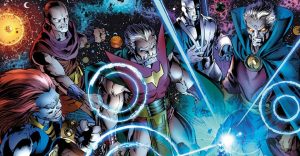Parasite: 7 Reasons Why It’s Bong Joon-ho’s Best Movie (& 7 Why It’s Not)

Bong Joon-ho is now a household name thanks to his most recent masterpiece, Parasite. It’s a traumatizing mix of film genres centered around one impoverished South Korean family who managed to leech off from a rich bourgeois family by posing as their helpers — hence the film’s title. Of course, being a Bong Joon-ho film, it doesn’t always end well. Best case scenario, the ending is bittersweet.
For many, Parasite was Bong Joon-ho at his best. In fact, the film even holds a 99% Certified Fresh rating on Rotten Tomatoes, meaning the number of critics who didn’t like the film can be counted on your fingers. Still, that isn’t to say Bong’s previous masterpieces were worse. Films like Okja, The Host, and Snowpiercer have withstood the test of time and solidified his name in cinema long before Parasite. Was Parasite his absolute best film yet? Let’s break that down so you can decide.
Updated February 7, 2020 by Sid Natividad: Months after the global official release of Parasite from May 21, 2019, it became available on DVD and Blu-Ray and its popularity reached even greater heights– enough for theaters to show it again. Hence, we couldn’t help but re-watch the whole masterpiece once again and rightfully add more deconstructive merits and demerits for the film, just in time before it theoretically wins some Oscars.
14 BEST: LANDSLIDE POPULARITY

When a film suddenly gets a lot more attention even after it’s original theatrical release, you know that it’s that good or at least controversial. This does happen all the time with Marvel Cinematic Universe (MCU) films but those are marketed to the masses while Parasite isn’t.
Moreover, it’s a foreign language film that received worldwide critical and general acclaim. One of its closest competitors is a superhero (or supervillain) movie, Joker, in popularity and by comparison. That’s a tall order, going up against a superhero film. Yet, Parasite managed to do it with flying colors.
13 NOT: RELIANCE ON SUSPENSION OF DISBELIEF

This might count as nitpicking but some of the more veteran film aficionados (read as couch potatoes) here are likely used to seeing liberal use of suspension of disbelief in plenty of films. It’s when the director or writers of the movie forego logic in hopes that the viewers will ignore something suspicious in the plot or narrative progress. As perfect as Parasite might be for some, it still utilizes this moviemaking pitfall.
While the plan to take over the helpers of the rich family’s household looked intricate and foolproof, much of it relied too much on the blind trust of the rich family. It would have been easy to Google some of the fake companies the poor family has set up to find out they’re a fraud. Additionally, the ending is also not exempted from this; the poor family’s father suddenly learns Morse code and was able to write several minutes of dialogue with it, hoping that his son would see or even pick up his messages, not knowing whether his “plan” would work.
12 BEST: NUMEROUS OSCAR NOMINATIONS

Let’s no discount one of the most undeniable reasons why Parasite is Bong’s best film, it’s up for several Oscars or Academy Awards. At the moment it’s currently nominated for Best Picture, Best Director, Best Foreign Language Film, Best Original Screenplay, Best Production Design, and Best Film Editing.
If all goes well, then Bong will certainly rake in some outstanding golden trophies this year. That depends on how well another bleak film about society competes, namely Joker. That one currently has more nominations than Parasite but they’re both competing for Best Picture and Best Director. It’s going to be a tough battle. Regardless, Parasite is a worthy Oscar magnet.
11 NOT: SHOPLIFTERS ALREADY WENT THERE

Funny thing is, Parasite wasn’t the first film to surprise everyone with a bleak narrative about a poor East Asian family struggling at the bottom of society. Someone already went there, namely the filmmakers of a lesser-known Japanese movie called Shoplifters. It’s a similar movie but focuses more on family instead of socio-economic problems.
Similarly, Shoplifters is also an award magnet and was even nominated for in the Academy Awards. Shoplifters also doesn’t rely much on tired and tested narrative shortcuts like suspension of disbelief and is more consistent to its genre while incorporating more substantial and interesting characters that are not social parodies or caricatures. Ultimately, this makes it more realistic than Parasite.
10 BEST: HIS MOST RELATABLE PROTAGONISTS SO FAR

Parasite is grounded in reality despite the absurdist narrative and plot twists. For that matter, the characters Bong painted for the film are his most relatable ones to date. Whereas Snowpiercer had ninjas, bloodthirsty soldiers, and cannibals, Parasite had humans who are merely trying to make ends meet.
All four members of the film’s indigent family are distinguishable from each other yet hauntingly similar. It’s not hard to imagine meeting people like them in the streets or in lesser financially stable parts of your city. It’s definitely a bold move on Bong’s part, one that he managed to portray successfully.
9 NOT: OKJA DEALT WITH A HEAVIER SUBJECT MATTER

Being set in lesser dynamic environments compared to Bong’s other films, Parasite presented a more focused subject. It’s about poverty, class divide, the effects of capitalism, and classism from the rich. Meanwhile, Bong’s Netflix outing, Okja, is a lot more daring in the issues it decided to tackle.
Apart from also including poverty and capitalism in the picture, it also squeezes in overt corporate greed, GMO, and global food crisis as well as the crimes to humanity of a certain pharmaceutical and food company. It was definitely a lot messier, but the subject matter is more dire and has a clear villain.
8 BEST: REALISM AND SOCIAL COMMENTARY

How Parasite presents its themes is something we have all seen in real life and is undeniable. Whatever was happening to the protagonist family of Parasite is also happening to millions or even billions of families worldwide.
Bong merely told their stories and how they got by through the day. How he also handled the disparity between the rich and the poor is hauntingly representative of how people are in reality. At times, Parasite can feel like a slice-of-life documentary.
7 NOT: THE MESSAGE IS NOT THAT CLEAR OUTSIDE OF SOUTH KOREA

Parasite’s message is a lot less discernible than many of Bong’s previous films. What was it about, in a nutshell? Treat the poor more nicely? Poverty is no joke? Rich people are hypocrites? Beyond those, you can’t really get much, unless you’re Korean.
Apparently, there’s more to the film if you view it with a certain cultural or political background. There a number of obvious references to the partition or “the line” dividing the country and many others surrounding the tension between North and South Korea. As a result, Parasite speaks more to Koreans than to anyone else outside the two countries.
6 BEST: UNPREDICTABLE STORY

One of the most obvious reasons why Parasite is such a masterful film is how the story always kept you on the edge of your seat. After all, t’s primarily a thriller, meaning the twists and turns in the plot are warranted. However, the events unfold feels mostly natural and not forced, unlike so many psychological thriller movies.
Apart from that, the story and plot itself are also one of the most unique this decade. In fact, the only thing similar to Parasite is a Japanese masterpiece, the slice-of-life drama, Shoplifters. Both films had an unpredictable story about impoverished people told masterfully and handled with care.
5 NOT: SLIGHT POVERTY PORN

Poverty porn is what a filmmaker (or artist) does to add surface-deep shock value to their media. It’s showing poverty for entertainment’s sake and only exists to make more fortunate viewers feel better about their status in life, as if the poor were merely fish in an aquarium.
At times, Bong’s film can feel like it’s gravitating towards this problematic media trope, particularly in the early establishing scenes or that flood scene. Thankfully, this is negated as soon as the film starts satirizing the rich, who are pretty much allegories for privileged people who love poverty porn.
4 BEST: TOP NOTCH CINEMATOGRAPHY & STORYTELLING

Not many directors can successfully stitch together a film consisting of many different genres. Parasite, for that matter, successfully combines horror, thriller, drama, and black comedy with a dash of absurdist satire.
The best part is that all of those were presented with Bong Joon-Ho’s most creative and cleanest use of camera angles, transitions, and lighting to date. There were moments and shots where Parasite even ended looking more like an art film.
3 NOT: SNOWPIERCER DID CLASS DIVIDE MORE IMAGINATIVELY

One of Bong’s earlier sci-fi films called Snowpiercer also explored similar ideas as Parasite except the portrayal of an unequal and unfair world is more fun and more imaginative in the former. Snowpiercer turns the world into one big post-apocalyptic train where the poor are all crammed in the back while the elite enjoyed lavishness at the front of the train.
It was already apparent in Snowpiercer that Bong knew how to handle such topics and transform them into a radical and digestible work of art. Parasite was understandably a lot less subtle and did make for a more depressing viewing as it’s closer to reality. Hence, Snowpiercer gave its poor and oppressed characters more justice and made them a lot less helpless.
2 BEST: IT WON IN CANNES

The Palm d’Or is the highest honor a filmmaker can receive in Cannes. Needless to say, any director or film that receives it will surely go down as one of the best in all of cinema history, perhaps even more so than Academy Awards’ Best Picture awardees in Hollywood. This year, Parasite and Bong took the Palm d’Or home.
The critics also almost unanimously agreed that Parasite is a great film and there was almost no opposition. As mentioned before, Shoplifter, Parasite’s spiritual twin brother, also got the Palm d’Or in 2018. In any case, Parasite is the first Bong Joon-Ho movie to get the Palm d’Or or win anything in Cannes.
1 NOT: IT LACKED TEETH

For all of Parasite‘s bark, specifically its daring delve into the depths of destitution, it lacked a certain bite that many of Bong’s films had before. Okja, Snowpiercer, and even The Host all tackled social and economic issues and they pointed out who was the culprit or the root of the injustice; Parasite simply did not (no, it wasn’t the rich bourgeoisie family).
While a director isn’t required to cater to the mandatory social responsibility of a relevant message or call-to-action for their films, depicting the very issues which made their film popular in the first place and not presenting a conclusion or solution (or at least presenting the perpetrators of the inequity) is a disservice to the source material.
About The Author

















